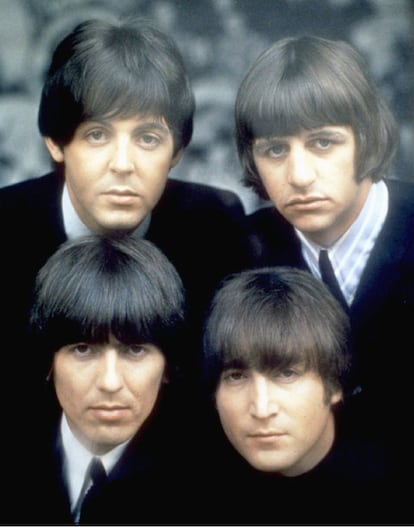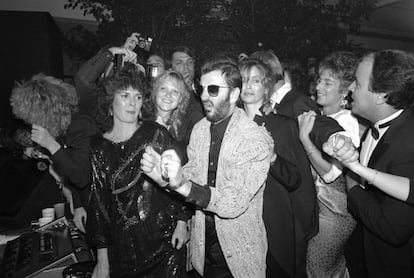Peace, love and questionable crypto art: How Ringo Starr keeps controversy at bay
The ex-Beatle has released a new EP this year, ‘EP3,’ in addition to an NFT collection that has been auctioned for tens of thousands of dollars


Ringo Starr has often been dubbed the “luckiest man in the world.” After becoming drummer for The Beatles following Pete Best’s dismissal in 1962, his contribution to the band’s body of work added up to a total of two songs, and his artistic involvement is the subject of an extensive debate that resurfaced last year following the release of the documentary miniseries The Beatles: Get Back, by Peter Jackson, where, throughout the almost nine hours that summarize the sessions that would result in the album Let It Be (1970), he barely says a couple of sentences between the heated arguments of John Lennon, Paul McCartney and George Harrison.
With a much less prestigious solo career than those undertaken by his colleagues, one filled with nostalgia and references to Beatles songs, in addition to a brief acting career that peaked with Caveman (1891) – a film whose characters communicated with grunts and onomatopoeia – Ringo Starr remains the world’s richest drummer, with an estimated net worth of $350 million. Far from retiring, on September of this year he released an EP with four original songs, not composed by him, titled EP3 (a follow-up to Zoom In and Change the World, both released last year), is still touring with his All Starr Band and has made his first foray into the world of crypto art by auctioning off a small collection of NFT images, created by himself, for several tens of thousands of dollars, under the title The Creative Mind of a Beatle.

The video that promoted the auction, of no better quality than a late-night commercial on local TV, caused a few taunts on Twitter; with some followers outright asking if he was having financial trouble. “Who would have thought I would spread peace and love in the metaverse?” Ringo asks in the ad, where he also offers the chance to meet his virtual avatar in a digital museum called RingoLand.
“There will always be someone willing to buy them. It wouldn’t matter if the frame was blank. Ringo sells his signature,” says author César San Juan Guillén, who in 2017 published the book Una historia de los Beatles: Las claves del porqué son el mejor grupo de la historia (A history of The Beatles: Keys to Why They are the Best Band in History). Ringo’s drawings are made with Microsoft Paint, a kind of train wreck between Warholian pop art (due to their themes) and art brut (due to their apparent lack of knowledge and technique). They are his best-known – and most mocked – work. But it’s hard to find someone who takes Starr’s work seriously enough to criticize it.
In The Simpsons, far from humiliating the ex-Beatle, his example and encouragement served as inspiration for Marge Simpson to pursue her career as an artist. And those who advocate for the value of these drawings, even if in most cases they do it from an ironic perspective, do seem to outnumber their detractors.
“Every once in a while, there comes a Leonardo da Vinci, who is just amazing at everything they try. And every once in a while there comes a Tommy Wiseau [the director of The Room, for many the worst film in history, which James Franco paid homage to in The Disaster Artist], who... isn’t. But most of us fall somewhere in between,” claims Lizzy Chrome in an essay titled In Defense of Ringo Starr’s Infamous MS Paint Art, published on the art site DeviantArt. They “look like a little kid’s drawing. Okay, I’m not saying this is ‘good’ per se, but it’s... got a pattern to it.” Many others who excuse him point out that the profits go to The Lotus Foundation, the charity created by Starr and his wife, Barbara Bach.
With his constant hippie callings for peace and love, and all the humor (usually harmless) generated at his expense, no one seems to have a particular dislike for the musician; he is practically impervious to criticism, no matter what he does. “Ringo was the first Beatle who had a fan club. He wasn’t the most handsome, he didn’t compose, he barely sang, but he triumphed since the beginning of the band. His attraction revolved around the face of a funny guy, always smiling and somewhat roguish, but harmless,” reflects San Juan Guillén.

A simple guy
Outside of the power struggle between John Lennon and Paul McCartney and the growing relevance that George Harrison and his mystical influences had on the evolution of the group, Ringo Starr has always been the figure in the background, the simple guy whom a regular person could easily relate to. In the eyes of the industry, he was the underdog: producer George Martin questioned his abilities and initially was against him joining the group, while his solo albums did not enjoy a very enthusiastic commercial reception.
At the same time, he stayed away from the subsequent fights between his former teammates, which he even tried to mitigate; for example, he publicly rejected the song How Do You Sleep?, Lennon’s diatribe against McCartney, in which Harrison collaborated. “With Lennon, McCartney and Harrison’s mercurial egos to contend with, Ringo was the emotional glue that held the Beatles together,” wrote John W. Whitehead in The Huffington Post in 2012, in an article published on the occasion of the band’s 50th anniversary.

Starr, moreover, was no stranger to the negative remarks about his performing style. Before the departure of George Harrison after an argument with McCartney during the Let It Be sessions (as seen in Get Back) Ringo had already left The Beatles. He cited feeling impostor syndrome while they recorded their previous album, known as The White Album. In an interview for the Beatles Anthology project, he confessed that he had had two reasons for leaving: that he was not playing very well and while the other three seemed quite happy, he felt like “an intruder.”
In an interview with comedian Jimmy Kimmel, Ringo mentioned a postcard that Paul McCartney had sent him, in which he told him that he was the best drummer in the world. Succinctly, he regretted that it had arrived “too late.”
“Ringo invents a different percussion for each of the Beatles songs, in such a way that it is easy to tell which one it is just by listening to the drum track,” observes César San Juan Guillén, doubting that his skills were really as limited as has been said. “He tends to set accents on the bass drum, which, coupled with him using right-handed drums while being left-handed, makes his style very recognizable. He was a human metronome, he kept the speed very well and his influence has been decisive in many later drummers.”
Has Ringo Starr used that nice, naive and humble image in his favor to do anything he wants without being affected by any controversy, such as his explicit support for Brexit or his involvement in the Panama Papers? “Not consciously,” thinks San Juan Guillén, who reckons that the fact that his statements do not contain “any type of major political analysis, only peace and love and better outside Europe” helps him more. “Regarding the Panama Papers, it has been enough for him to do absolutely nothing, the same as Bono, Elton John, Shakira, Julio Iglesias or Miguel Bosé, who also appear there and do not exactly have that image of naivety that we associate with Ringo,” he says.
Thick-skinned after a lifetime of criticism, it seems clear that the octogenarian Starr cares little for any reputational crisis he may have at this point, even if he hasn’t really experienced any repercussions. Just like his pictorial works could after all be of interest, insofar as they express something deep about their author: that the insecurities that he once felt about his talent have, undoubtedly, disappeared.
Tu suscripción se está usando en otro dispositivo
¿Quieres añadir otro usuario a tu suscripción?
Si continúas leyendo en este dispositivo, no se podrá leer en el otro.
FlechaTu suscripción se está usando en otro dispositivo y solo puedes acceder a EL PAÍS desde un dispositivo a la vez.
Si quieres compartir tu cuenta, cambia tu suscripción a la modalidad Premium, así podrás añadir otro usuario. Cada uno accederá con su propia cuenta de email, lo que os permitirá personalizar vuestra experiencia en EL PAÍS.
¿Tienes una suscripción de empresa? Accede aquí para contratar más cuentas.
En el caso de no saber quién está usando tu cuenta, te recomendamos cambiar tu contraseña aquí.
Si decides continuar compartiendo tu cuenta, este mensaje se mostrará en tu dispositivo y en el de la otra persona que está usando tu cuenta de forma indefinida, afectando a tu experiencia de lectura. Puedes consultar aquí los términos y condiciones de la suscripción digital.








































